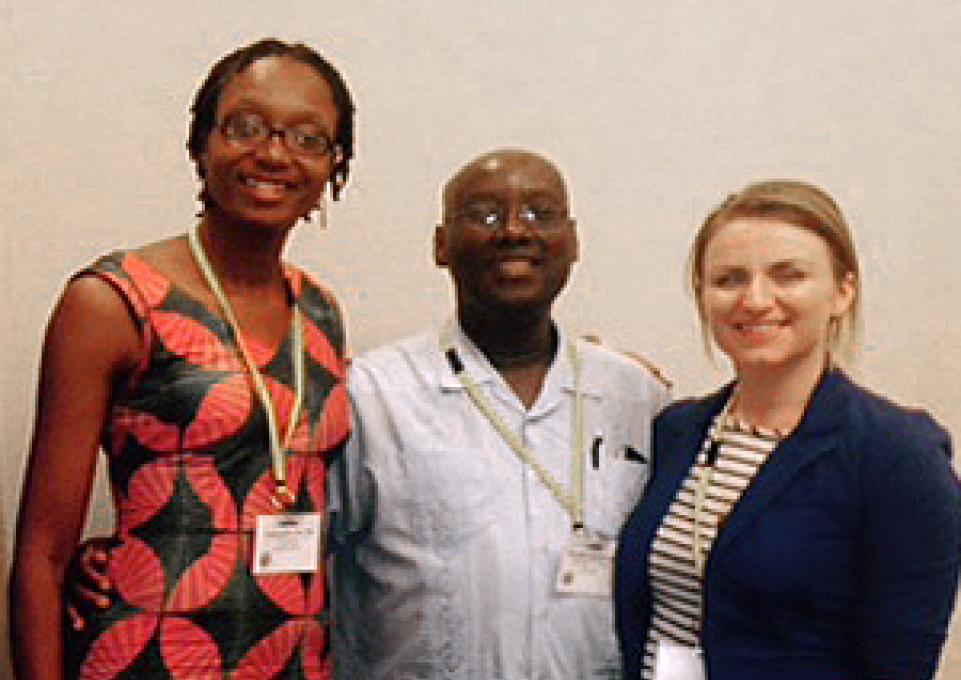
As a teenager, Cassandra St. Vil, ’05 (pictured at left), was a troublemaker who ran away from home. She graduated from high school with just a 72.5 average. Yet she has received a full merit-based scholarship to earn her third master’s degree, this one from Harvard University.
“I lucked out,” she said. “I ended up on the right street corner in Queens.”
That street corner was the local YMCA where St. Vil participated in youth leadership programs while in high school. She began to aid other teens and received a scholarship for her work, which helped her get into Buffalo State through its Educational Opportunity Program.
“I knew I wanted to work with teenagers,” said St. Vil, “So I decided to major in social work.” By her sophomore year, she decided to go for a Ph.D., and was accepted into the McNair Scholars Program.
“College was a way for me to prove myself to myself,” she said. “If anything interested me, I tried it.”
African American Studies was among the topics that interested St. Vil. Through her courses she discovered Africana Studies—the study of African people and their descendants throughout the world.
“As I learned more,” she said, “I realized that a big piece of my teenage rebelliousness was that I was screaming inside.” During adolescence, young people are developing a sense of identity. But St. Vil's mother, who immigrated to the U.S. from Haiti, discouraged her daughter from connecting with her native culture. “We would only speak English at home,” St. Vil said, “so I couldn’t even understand my relatives in Haitian Creole.”
She couldn’t draw on her heritage, but neither could she see a promising way forward.
“As a kid and a teenager, there is no way to connect to a black identity that’s positive,” St. Vil said. “Most black identity comes from a place of pain and suffering and struggle. The texts are all about slavery and lack of civil rights, being down and broken. The narratives all say, ‘You’re going to jail, your fathers are absent.’ Apart from Rosa Parks and Martin Luther King, I didn’t learn anything positive about black identity until I was 19 years old and in college.”
St. Vil remained passionate about her desire to work with teens and began to envision a way to help young people of color develop a positive self-identity early in life. After she earned her first master’s in social work at the University at Michigan, she earned a Ph.D.in African Studies at Howard University. And, to reach as many young people as possible, she took a job with Teach for America (an AmeriCorps program) teaching full-time at a Bronx high school where all the students were people of color. At night, she earned a master’s in education from Hunter College.
After years of studying the African diaspora, St. Vil sought an opportunity to visit Africa. She taught in Rwanda for two years, beginning in fall 2014 through the Peace Corps. She has received a U.S. Fulbright Scholar award to teach education majors at the University of the Witwatersrand in South Africa in spring 2017. Her courses will provide practical ways to infuse Africana studies into the classroom to help students of color develop a positive identity.
“For example,” she said, “if you’re doing a lesson on math, you could include a clip from the movie Hidden Figures showing African American women doing math for NASA.”
At Harvard, St. Vil will pursue a master’s in school leadership to further her goal of founding schools that combine Africana studies with youth development. She said, “I think all black youth feel a conflict with their identity. I can dedicate my whole career to this and I won’t be wasting a minute.”
Pictured (left to right): St. Vil; Aimable Twagilimana, Buffalo State professor of English; and Ashley Weselak, '13, '16, at the Sub-Saharan Africa Fulbright Orientation, June 2016.
